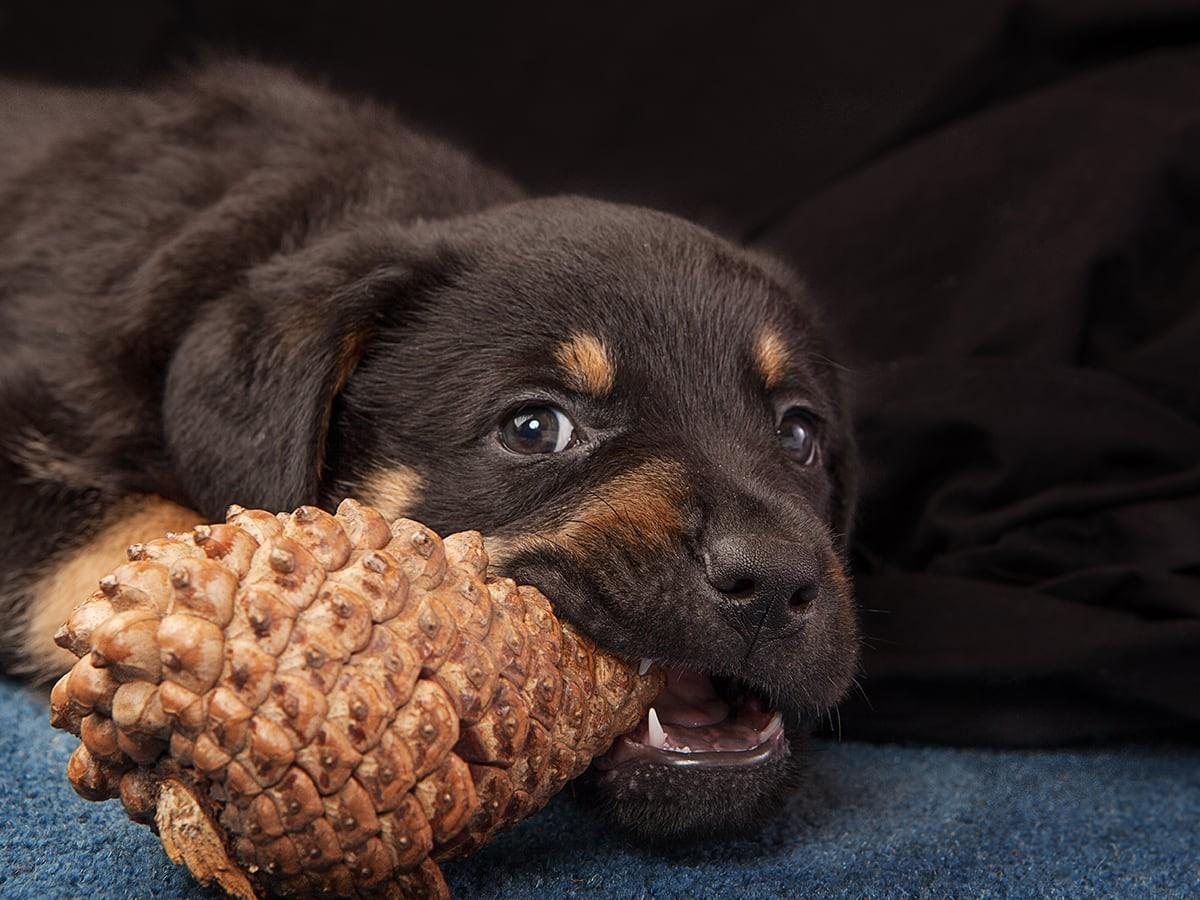Is your puppy chewing everything in sight – from hands to shoes? Are you wondering why they’re finding anything they can gnaw on – and how you can deter the unwanted biting?
If you’ve ever played with a young pup, you might have noticed how they love to gnaw on your fingers. This behavior is not malicious but a natural response to pains they experience in their mouths as teeth grow in.
But as a puppy owner, it is good to know why your puppy is doing this, how you can discourage painful nibbling, and how you can alleviate their pain.
What is happening to my puppy’s teeth?
Similar to babies, puppies have teeth growing in as they get older. There can be natural discomfort accompanied by this change. Biting is an instinctive response as they attempt to reduce pain in their mouths.
Puppies start with 28 baby teeth, formally known as deciduous teeth. If you’ve ever heard of “needle teeth” in puppies, that refers to deciduous teeth. They are especially sharp and can be painful if your puppy is trying to chew on your hands, legs, or any body part. It is always good to keep chew toys around to have something on hand to give your pup as a chewing replacement.
These deciduous teeth will slowly fall out as your puppy grows to make room for the permanent set. Eventually, your puppy will have 42 permanent teeth. These permanent teeth are considerably duller and are the teeth your pup will have for the rest of their life.
During the process where deciduous teeth fall out, and permanent teeth move in, your puppy might swallow or drop a few baby teeth around your house. It is not something to be concerned about if you find a bloody tooth or if your puppy swallows them – this is to be expected. It is safe for puppies to swallow these, and it is common. While puppy’s mouths make room for permanent teeth and get rid of the baby set, there might be some blood. It might even show up on your pup’s chew toys. Don’t worry if you see these red marks! Like human mouths, expect some bleeding as their mouths grow and shift.
Why is my puppy biting everything in sight?
As these teeth shift within your pup’s mouth, it can be uncomfortable and cause your puppy to search for relief through chewing. Naturally, puppies love to chew as they learn about their surroundings and test their limits. The combination of this curiosity and the pain in their mouths is driving them to bite down on anything they can. As puppies chew, it relieves some of the pain and helps them work through the teething process.
Although it can be annoying, this chewing around your house is nothing ordinary.
The best chew toys for your teething pup
Having something that your puppy can gnaw on that isn’t human or valuable is crucial during this time. Chew toys are the perfect solution to your puppy biting excessively as you can place them in their mouths as a substitute teething object.
Certain things to give your puppy to chew on are better than others, but this depends on your preference and your dog. Some owners will provide bones or rawhides, but others prefer synthetic toys. With any chew toy, there is a risk as your pup could ingest pieces of it. If it is edible, it could upset their stomach. For these reasons, make sure to supervise your puppy when you give them chew toys to ensure they are gnawing away safely!
Although there is no consensus about what is the best chew toy, many veterinarians discourage giving your puppy anything too hard, such as an antler or a hard plastic toy. A good rule of thumb is not to give your puppy anything that doesn’t bend. These chew toys could hurt your puppy’s mouth. During this sensitive time, their gums are exposed, so the best toys are ones that will not irritate their mouths.
Is there anything I can do to stop my dog from biting?
It isn’t possible to stop your puppy from biting entirely – as teething is instinctual – but you can take steps to deter them from chewing on people or household items. It is important to establish which behavior is acceptable and not praise your puppy as they are biting.
Here are some ways you can try to reduce the amount of hurtful biting your puppy is doing.
React Negatively – It’s simple enough not to praise your puppy for biting, but you can take it one step further. Start reacting in a way that shows your puppy you are disgruntled with the behavior as they bite you. If your puppy bites you or another person, let out a shriek similar to what a fellow dog would do and walk away. This reaction will show them that what they did is not tolerated.
Distract Them – If you are with your puppy and they start to gnaw, you can redirect their energy toward a different activity. Bring out a squeaky toy, a ball or take them outside. By shifting their focus, you can get them to stop biting you and give them good stimulation. The more active your puppy is, the happier they are, so this is a win-win.
Hide Anything Tempting – You can’t blame your young pup for chewing on a sneaker if it is within their reach. They do not know the difference between designated toys and your things yet, so anything their mouth can reach is fair game. Save yourself the trouble of cleaning up a sock in shambles or what used to be a flip flop; put all these things away.
Lots of Chew Toys! – Puppies love toys for many reasons; they are exciting and great for playing. But like mentioned above, they can also be great for relieving teething pain. Instead of your items, leave some chew toys around. That will then be your puppy’s first stop when looking for something to gnaw. Always supervise your puppies with their chew toys if they swallow a piece.
When does teething stop?
If you are at your wit’s end with your puppy’s razor-sharp teeth, don’t fret! There is an end in sight. All puppies grow out of teething, and typically they will stop constantly chewing around eighteen months. This number is dependent on your puppy, as some dogs will chew for less or more time. If your dog continues chewing into their adult life, you may want to enforce anti-biting rules more strictly.
Dogs will always chew as part of how they assess their surroundings, but the teething stage is probably the most your dog will be gnawing on you. It is good to remember your pup means no harm by this behavior, and they are only trying to relieve discomfort.

As Spot’s resident cat enthusiast, I am dedicated to researching and sharing information that helps pet owners take the best care of their pets. Pet ownership comes with it’s share of challenges, but my goal is to help make this journey easier.












